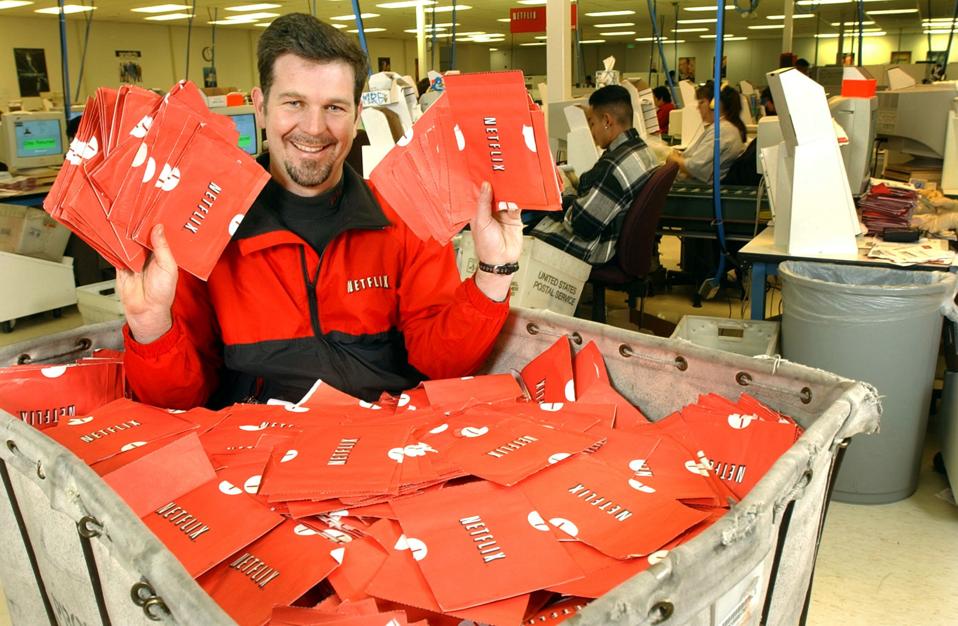Last April Netflix announced, after 25 years, they were shutting down their DVD rental business. The last disc would be mailed on September 29. In a surprise, this week, Netflix announced that after the September 29 deadline their subscribers have the option to keep any DVDs. Netflix told subscribers, “Please enjoy them for as long as you like! If you do choose to return the disc, we will continue to accept returns until October 27, 2023.”
Moreover, as Netflix empties their DVD library, subscribers may be able to get up to ten free disks. The streaming giant announced via an email, “After 25 years of movies in the mail, we’re approaching the end of our final season. We really appreciate that you’re sharing movie nights with us until the last day. Let’s have some fun for our finale!” The Netflix offer expires on August 29 and is available only to U.S. subscribers via its DVD.com website.
Netflix DVD service began in 1997 as a pay-per-rental business. In 1999, the business model shifted, as subscribers would provide a list of DVDs they’d like to rent and Netflix would ship them out when they became available. Netflix (along with Redbox rental kiosks), had successfully competed with such brick-and-mortar DVD rental retailers as Blockbuster and Hollywood Video.
Over the quarter century, Netflix has mailed 5.2 billion DVDs, to 40 million unique subscribers, with its familiar red envelopes. In its announcement, Netflix noted their first DVD rental was Tim Burton’s Beetlejuice, starring Michael Keaton and Geena Davis on March 10, 1998. As it shuts down, Netflix still has an estimated 1.1 million to 1.3 million DVD rental subscribers.
In announcing the closing of their DVD unit, Netflix said, “Our goal has always been to provide the best service for our members, but as the DVD business continues to shrink, that’s going to become increasingly difficult.” Over the past decade, revenue from the Netflix DVD unit has been declining annually from over $900 million in 2013 to only $145.7 million last year. By comparison, total revenue for Netflix in 2022 was $31.6 billion.
Netflix DVD Revenue 2013-2022
(in millions)
2013 $911
2014 $765
2015 $646
2016 $542
2017 $450
2018 $366
2019 $297
2020 $239
2021 $182
2022 $146
Source: Netflix
The drop in the revenue of Netflix DVD unit follows industry trends. The Digital Entertainment Group reports, in 2022, DVD and Blu-ray sales in the U.S. were an estimated $1.58 billion, a decline of nearly 20% from $1.97 billion in 2021. In addition, disc rentals had declined from $602.7 million in 2021 to $502.4 million last year. In comparison, in 2005, DVD sales peaked with $16.3 billion in sales and disc rentals adding another $6.5 billion. About half of all U.S. households still own a DVD player, compared to over 80% in 2006. Earlier this month, Disney announced they would no longer be selling DVDs of Blu-ray discs in Australia, citing low sales.
The demise of the DVD came with the emergence of streaming video as an entertainment alternative. In 2007 Netflix launched its streaming video service. The streaming version of Netflix was originally a supplemental unit to the core DVD-mailing business. By the end of 2010, however, the streaming business had become more popular than DVD rentals and never looked back.
As the DVD business dwindled, the streaming unit grew sizably, upending the video industry in the process. In second quarter 2023, Netflix reported having 238.4 million global streaming subscribers, including 75.6 million in the U.S. and Canada. With its crack down on password sharing, Netflix in July, reportedly added 2.6 million net new subscribers in the U.S.
In an unusual corporate misstep, Netflix, in 2011, launched the ill-fated Qwikster. Even before House of Cards and Orange is the New Black, Netflix feared its DVD business would stymie corporate growth . The strategy had been to split the DVD and streaming business in two, calling the DVD business Qwikster. The combined two companies led to a monthly price increase from $10 to $16. Netflix subscribers balked at the rate hike and nearly one million subscribers quickly dropped the service.
Three weeks after its launch, the Qwikster experiment was shelved. Netflix CEO Reed Hastings said, Netflix would abandon the plan to separate the two units, writing; “It is clear that for many of our members two websites would make things more difficult, so we are going to keep Netflix as one place to go for streaming and DVDs. This means no change: one website, one account, one password… in other words, no Qwikster.”
Entertainment attorneys point out that by giving away the DVDs, Netflix, which has only licensing agreements to the discs, could be open to legal action from filmmakers and studios, who own the content. The Netflix announcement came at a time when Hollywood studios have been shut down with a work stoppage from screenwriters and screen actors.

